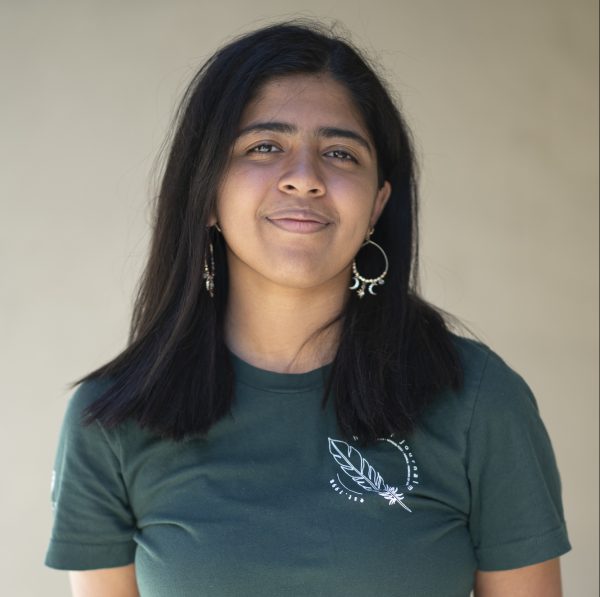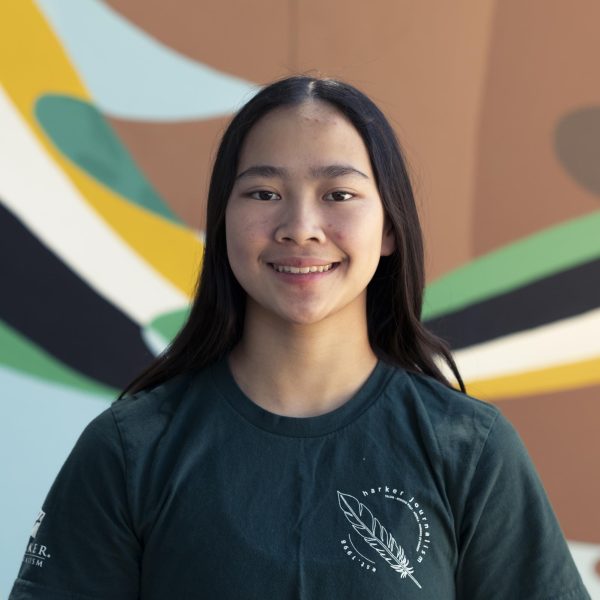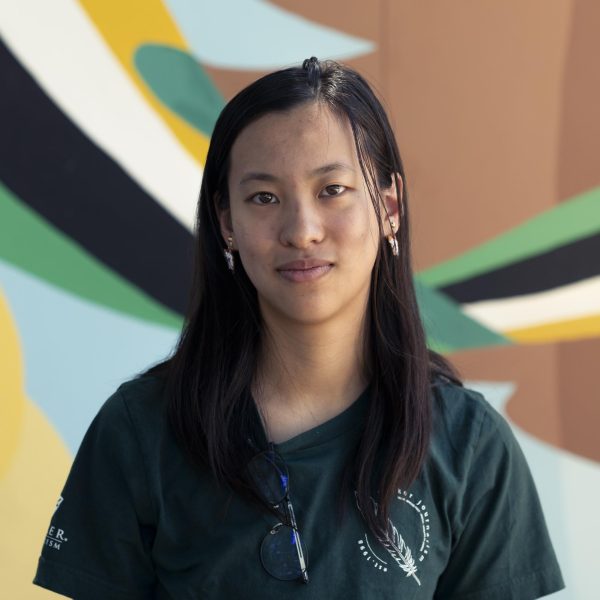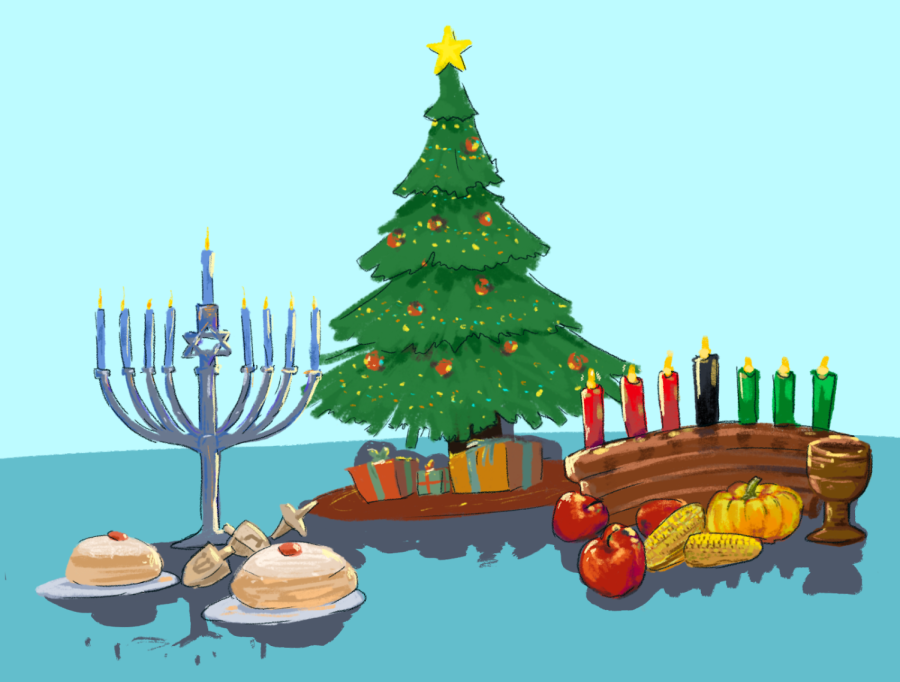Dashing into the season of celebration
As the Holiday season arrives, many students celebrate a variety of different holidays. “It’s less of the religious aspects behind it, or the traditional meaning of Christmas,” Zubin Khera (12) said. “It’s more so a reason to meet up with family, have a good time and spread the cheer to your friends.”
The chilly December breeze, the smell of hot chocolate, and the sound of carolers— signs that point to the start of the holiday season. For Zubin Khera (12), he recalls spending one Christmas in Truckee, California. His dad surprised him with a stack of vintage comic books, such as Archie and Marvel comics. Zubin spent the rest of his time in Truckee flipping through each comic, which even kept him from sleeping.
With the holidays around the corner, students and faculty have begun getting ready for the arrival of many celebrations, such as Christmas, Hanukkah and Kwanzaa.
For Adam Pawliger (10), the arrival of the holiday season means that it’s the time to start lighting the candles of the hanukiah, which is a candelabra with nine candle holders used for Hanukkah. The Hanukiah represents a miracle of the oil burning for eight straight days, rather than one. Adam remembers having a party with his friends and family to celebrate Hanukkah. At the party, Adam and his friends would exchange presents and make special foods related to Hanukkah, such as latkes.
“We would get together, myself and other students from Harker, and we would have a Hanukkah party,” Adam said. “We would all bring food, and make latkes and donuts. [I feel like Hanukkah is] a nice opportunity to get together with my family and have friends over, and eat and celebrate together. It’s very comforting.”
Hanukkah is an eight-day Jewish celebration that commemorates the rededication of the Second Temple in Jerusalem, where Jews revolted against the Greek-Syrian oppressors during the Maccabean Revolt. In the story, to honor the temple, a menorah was supposed to be lit every night. There was only enough olive oil for a menorah’s candles to burn for one day. However, the menorah burned for eight continuous days and nights, which is why Hanukkah is celebrated for eight days. It usually begins during November or December, and consists of lighting candles on a menorah or hanukiah, gift-giving, traditional foods, and games such as dreidel.
In addition to Hanukkah, Christmas is a holiday that is widely celebrated. Observed on Dec. 25, the celebration of Christmas began when Christians started celebrating it as the anniversary of the birth of Jesus; however, as time has gone on, Christmas developed into the U.S.’s most popular national holiday, with people celebrating for many different reasons.
“It’s less of the religious aspects behind it, or the traditional meaning of Christmas,” Zubin said. “It’s more so a reason to meet up with family, have a good time and spread the cheer to your friends. Tell them how much you value them and that you appreciate them even though that’s for Thanksgiving, but a little bit of that can come out during Christmas, also.”
Zubin added that his family always buys a Christmas tree, decorating it with collected family ornaments. Then, the day after, they drive over to his cousin’s house, opening presents together and spending the day playing games. Christmas is a time for holiday traditions, with many unique traditions in each family as well as the classic Christmas tree and gift giving.
“I think obviously there’s the holiday tradition of creating a new year’s resolution,” Zubin said. “Of course, not to say that I don’t really follow them very often. I try to but that doesn’t go as planned, but having a goal to set for yourself every year. I think it’s a very healthy thing, and Christmas is a good time to keep yourself accountable for those goals.”
Kwanzaa, a week-long celebration observed from Dec. 26 to Jan. 1, honors African American culture. Dr. Maulana Karenga created it in 1966 as a way to unite the community after the Watts riots, which were a series of violent encounters between South Central Los Angeles police and residents of Watts and other predominantly African American neighborhoods.the celebration has spread throughout the U.S. and into parts of the Caribbean. Each day celebrates a different principle with unity, self-determination, collective work, cooperative economics, purpose, creativity and faith.
Like Hanukkah, Kwanzaa also has a type of candelabra called the Kinara. The Kinara has seven candles, each one representing the different principles. An ear of corn is placed under the Kinara as well, to represent any children in the families that are celebrating Kwanzaa. People usually hold a big feast to celebrate as well.
On Dec. 8, the Harker community celebrated through Winterfest afterschool, which the Harker Spirit Leadership Team (HSLT) planned. The annual event started last year, and includes various games, such as ice-fishing and a trivia game, along with food, cookie decorating and a movie night where students could watch the holiday-movie, “Elf.”
“The time between Thanksgiving Break and Winter Break is definitely a very stressful period,” HSLT member Anja Ree (12) said. “I remember when I was a freshman, I was stressed because it was my first final. I feel going to Winterfest, or planning Winterfest, is helpful because it gives you a break from studying and the time-crunch from those two breaks. You can go to it, have fun with your friends for a couple of hours, and it’s a nice in-between from our big spirit events.”

Vika Gautham (11) is the co-features editor for Harker Aquila and the Winged Post, and this is her third year on staff. This year, Vika wishes to provide...

Isabella Lo (12) is a Managing editor for Harker Aquila, and this is her fourth year on staff. This year, she looks forward to learning more about multimedia...

Mirabelle Feng (12) is a Student Life editor for the TALON Yearbook, and this is her fourth year on staff. This year, she looks forward to creating unique...


















![“[Building nerf blasters] became this outlet of creativity for me that hasn't been matched by anything else. The process [of] making a build complete to your desire is such a painstakingly difficult process, but I've had to learn from [the skills needed from] soldering to proper painting. There's so many different options for everything, if you think about it, it exists. The best part is [that] if it doesn't exist, you can build it yourself," Ishaan Parate said.](https://harkeraquila.com/wp-content/uploads/2022/08/DSC_8149-900x604.jpg)




![“When I came into high school, I was ready to be a follower. But DECA was a game changer for me. It helped me overcome my fear of public speaking, and it's played such a major role in who I've become today. To be able to successfully lead a chapter of 150 students, an officer team and be one of the upperclassmen I once really admired is something I'm [really] proud of,” Anvitha Tummala ('21) said.](https://harkeraquila.com/wp-content/uploads/2021/07/Screen-Shot-2021-07-25-at-9.50.05-AM-900x594.png)







![“I think getting up in the morning and having a sense of purpose [is exciting]. I think without a certain amount of drive, life is kind of obsolete and mundane, and I think having that every single day is what makes each day unique and kind of makes life exciting,” Neymika Jain (12) said.](https://harkeraquila.com/wp-content/uploads/2017/06/Screen-Shot-2017-06-03-at-4.54.16-PM.png)








![“My slogan is ‘slow feet, don’t eat, and I’m hungry.’ You need to run fast to get where you are–you aren't going to get those championships if you aren't fast,” Angel Cervantes (12) said. “I want to do well in school on my tests and in track and win championships for my team. I live by that, [and] I can do that anywhere: in the classroom or on the field.”](https://harkeraquila.com/wp-content/uploads/2018/06/DSC5146-900x601.jpg)
![“[Volleyball has] taught me how to fall correctly, and another thing it taught is that you don’t have to be the best at something to be good at it. If you just hit the ball in a smart way, then it still scores points and you’re good at it. You could be a background player and still make a much bigger impact on the team than you would think,” Anya Gert (’20) said.](https://harkeraquila.com/wp-content/uploads/2020/06/AnnaGert_JinTuan_HoHPhotoEdited-600x900.jpeg)

![“I'm not nearly there yet, but [my confidence has] definitely been getting better since I was pretty shy and timid coming into Harker my freshman year. I know that there's a lot of people that are really confident in what they do, and I really admire them. Everyone's so driven and that has really pushed me to kind of try to find my own place in high school and be more confident,” Alyssa Huang (’20) said.](https://harkeraquila.com/wp-content/uploads/2020/06/AlyssaHuang_EmilyChen_HoHPhoto-900x749.jpeg)



